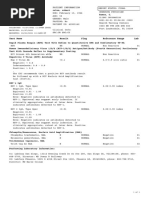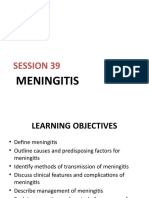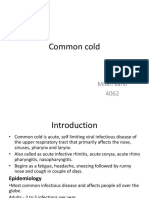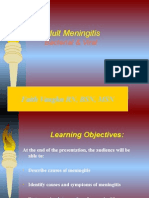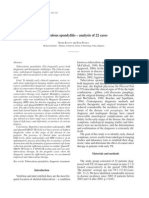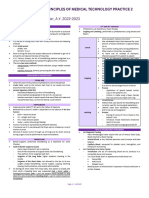0 ratings0% found this document useful (0 votes)
135 viewsMeningitis
Meningitis
Uploaded by
naveen chaudharyMeningitis is an inflammation of the meninges, which surround the brain and spinal cord. It can be caused by bacterial, viral, or fungal infections. Bacterial meningitis is very serious and requires prompt antibiotic treatment. Common symptoms include fever, headache, stiff neck, nausea, and confusion. Vaccines can help prevent some types of bacterial meningitis.
Copyright:
© All Rights Reserved
Available Formats
Download as PPT, PDF, TXT or read online from Scribd
Meningitis
Meningitis
Uploaded by
naveen chaudhary0 ratings0% found this document useful (0 votes)
135 views15 pagesMeningitis is an inflammation of the meninges, which surround the brain and spinal cord. It can be caused by bacterial, viral, or fungal infections. Bacterial meningitis is very serious and requires prompt antibiotic treatment. Common symptoms include fever, headache, stiff neck, nausea, and confusion. Vaccines can help prevent some types of bacterial meningitis.
Original Description:
Meningitis
Original Title
(Meningitis)
Copyright
© © All Rights Reserved
Available Formats
PPT, PDF, TXT or read online from Scribd
Share this document
Did you find this document useful?
Is this content inappropriate?
Meningitis is an inflammation of the meninges, which surround the brain and spinal cord. It can be caused by bacterial, viral, or fungal infections. Bacterial meningitis is very serious and requires prompt antibiotic treatment. Common symptoms include fever, headache, stiff neck, nausea, and confusion. Vaccines can help prevent some types of bacterial meningitis.
Copyright:
© All Rights Reserved
Available Formats
Download as PPT, PDF, TXT or read online from Scribd
Download as ppt, pdf, or txt
0 ratings0% found this document useful (0 votes)
135 views15 pagesMeningitis
Meningitis
Uploaded by
naveen chaudharyMeningitis is an inflammation of the meninges, which surround the brain and spinal cord. It can be caused by bacterial, viral, or fungal infections. Bacterial meningitis is very serious and requires prompt antibiotic treatment. Common symptoms include fever, headache, stiff neck, nausea, and confusion. Vaccines can help prevent some types of bacterial meningitis.
Copyright:
© All Rights Reserved
Available Formats
Download as PPT, PDF, TXT or read online from Scribd
Download as ppt, pdf, or txt
You are on page 1of 15
What is Meningitis?
Dr-Fayaaz Chandio PT, DPT
Meningitis is an inflammation of the meninges, which, if
severe, may become encephalitis, an inflammation of
the brain.
• Infection of the fluid in the spinal cord and the fluid that
surrounds the brain
• Viral or Bacterial
• Etiology is important because of the seriousness of the
illness and the treatment needed
Causes of Meningitis
- Bacterial Infections
- Viral Infections
- Fungal Infections
(Cryptococcus neoformans
Coccidiodes immitus)
- Inflammatory diseases
- Cancer
- Trauma to head or spine.
Viral Meningitis
• Usually clears up in a week or two with
no specific treatment
• Common; rarely serious infection of
fluid in the spinal cord or fluid that
surrounds the brain
• Also called aseptic meningitis
Causes of Viral Meningitis
• Caused by a number of different viruses
mosquito-borne viruses
occasionally seen after strep throat in
young adults
common intestinal viruses account for
half of U.S. cases per year
Signs and Symptoms
• Usually occur one week after exposure
Fever
Headache
Stiff neck
Tiredness
Rash
Sore Throat
Vomiting
Treatment and Prevention
• No specific treatment for viral meningitis
• Antibiotics do not work on viruses
• Pay careful attention to personal hygiene
• Good hand-washing helps prevent
spread of infection and viruses
Bacterial Meningitis
• A serious infection of the fluid of the spinal
cord and the fluid that surrounds the brain
• Results from bacterial invasion of
membrane that covers the brain and spinal
cord (meninges)
• Meninges become swollen and inflamed,
leading to classic s/s of meningitis
Causes of Bacterial Meningitis
• Pneumococcal, Streptococcus pneumoniae
(38%)
• Meningococcal, Neisseria meningitidis (14%)
• Haemophilus influenzae (4%)
• Staphylococcal, Staphylococcus aureus (5%)
• Tuberculous, Mycobacterium tuberculosis
How do people get Bacterial
Meningitis?
• Bacteria are spread through direct contact with
secretions from the nose or throat of an
infected person
• None of the bacteria that cause meningitis are
very contagious
• Not spread by casual contact or by simply
breathing the same air where the person
infected has been sitting
Signs and Symptoms
Under Age 2 Over age 2
• Fever • High fever
• Headache • Headache
• Stiff neck • Stiff neck
• Inactivity • Nausea and vomiting
• Vomiting • Sensitivity to light
• Poor feeding • Confusion
• Seizures • Sleepiness
May be hard to detect in • Petechiae that spreads
infants rapidly
• seizures
Diagnosis & Treatment
• Diagnosed via lumbar puncture (spinal tap)
• Check for bacterial growth in the spinal fluid
• Antibiotic administration based on bacteria found
• Close contacts identified and treated also
• Early diagnosis and treatment important
Potential Complications
• Advanced bacterial meningitis can lead to
brain damage, coma, and death
• Survivors can suffer long-term hearing
loss, mental retardation, paralysis, and
seizures
Vaccinations
• Hib vaccine (3 doses • Pneumococcal vaccine
by 6 months of age ineffective in persons
and a booster under age 2
between 12-18 Recommended for all
months of age) persons over age 65
with certain medical
problems
You might also like
- Reseach ProposalDocument16 pagesReseach ProposalUmmul Khair Alam60% (5)
- MeningitisDocument15 pagesMeningitisAniket Singh100% (2)
- Test Name Result Flag Reference Range Lab: Patient InformationDocument1 pageTest Name Result Flag Reference Range Lab: Patient InformationRobNo ratings yet
- Prepared by Edy Purnomo DR, SP.SDocument25 pagesPrepared by Edy Purnomo DR, SP.SdzikroulNo ratings yet
- MeningitisDocument46 pagesMeningitisSohaima MaryumNo ratings yet
- Encephalitis and MeningitisDocument37 pagesEncephalitis and MeningitisSri Ram 07No ratings yet
- MeningitisDocument52 pagesMeningitismeenoNo ratings yet
- Lec 2 MeningitisDocument19 pagesLec 2 Meningitisvrutika128No ratings yet
- Meningitis Encephalitis, Brain Abscess Fff - FinalDocument62 pagesMeningitis Encephalitis, Brain Abscess Fff - FinalRichmond GyemfiNo ratings yet
- MeningitisDocument10 pagesMeningitisLisa ReyesNo ratings yet
- MeningitisDocument15 pagesMeningitisFreda MorganNo ratings yet
- Diseases of Nervous SystemDocument31 pagesDiseases of Nervous SystemJoshell Roz RamasNo ratings yet
- Inflammation of CNSDocument38 pagesInflammation of CNSTauqeer AhmedNo ratings yet
- Meningitis 222Document11 pagesMeningitis 222Keziya SimonrajNo ratings yet
- Session 39 MeningitisDocument25 pagesSession 39 MeningitisJohn MoshaNo ratings yet
- Management of Patient With Meningitis and Encephalitis: ModeratorDocument71 pagesManagement of Patient With Meningitis and Encephalitis: ModeratorSachin DwivediNo ratings yet
- MeningitisDocument71 pagesMeningitisBelinda SolochiNo ratings yet
- MeningitisDocument15 pagesMeningitisAliya DawoodNo ratings yet
- Pathology AssignmentDocument5 pagesPathology Assignmentmrjq62097No ratings yet
- MeningitisDocument15 pagesMeningitisApw ReknNo ratings yet
- Presentation On MeningitisDocument51 pagesPresentation On Meningitissushma shresthaNo ratings yet
- Meningitis 170131181426Document71 pagesMeningitis 170131181426RAMJIBAN YADAVNo ratings yet
- NCC-Bacterial Meningitis-RNDocument17 pagesNCC-Bacterial Meningitis-RNf846289j6yNo ratings yet
- Common Cold: Milan Karki 4062Document20 pagesCommon Cold: Milan Karki 4062BinayaNo ratings yet
- Cerebrospinal MeningitisDocument11 pagesCerebrospinal Meningitisraphael chidiebereNo ratings yet
- Brain InfectionDocument61 pagesBrain Infectionmanisha paikarayNo ratings yet
- Pediatric MeningitisDocument28 pagesPediatric MeningitisDbktNo ratings yet
- Meningitis Virus: Yusi Rizky N. 1610211051Document12 pagesMeningitis Virus: Yusi Rizky N. 1610211051Yusi RizkyNo ratings yet
- Group 2 - Life in The Meningitis BeltDocument21 pagesGroup 2 - Life in The Meningitis BeltMark SmithNo ratings yet
- 2 LO2 Vaccine PreventableDocument76 pages2 LO2 Vaccine PreventableBelay GezahegnNo ratings yet
- Bacterial MeningitisDocument2 pagesBacterial MeningitisSinclair Broadcast Group - EugeneNo ratings yet
- Meningitis What Is Meningitis?: Viral - Caused by A VirusDocument3 pagesMeningitis What Is Meningitis?: Viral - Caused by A VirusChristian Angelo Cabaron SantiagoNo ratings yet
- Meningit IS: Vicjane A. Gabuco BSN 3A-Group 2 Manuel S. Enverga University Foundation San Lazaro HospitalDocument15 pagesMeningit IS: Vicjane A. Gabuco BSN 3A-Group 2 Manuel S. Enverga University Foundation San Lazaro Hospitaluchiha japeNo ratings yet
- Microbio Nervous System LectureDocument15 pagesMicrobio Nervous System LecturesweetiepotamusNo ratings yet
- MeningitisDocument18 pagesMeningitisAteeq RahmanNo ratings yet
- MENINGITISDocument5 pagesMENINGITISapi-3822433100% (1)
- 11.MeningitisDocument32 pages11.Meningitisopio63309No ratings yet
- Meningitis in ChildrenDocument17 pagesMeningitis in ChildrenNurul NajibNo ratings yet
- VaccineDocument15 pagesVaccinenuhahamdyNo ratings yet
- Bacterial MeningitisDocument51 pagesBacterial MeningitiscaseinrenninNo ratings yet
- MeningitisDocument6 pagesMeningitisCheena DolormenteNo ratings yet
- Meningitis in Children 2008: Sileshi Mulatu (BSC N, MSC N)Document81 pagesMeningitis in Children 2008: Sileshi Mulatu (BSC N, MSC N)yohanes100% (1)
- Meningitis: Edgar Maldonado Period 8Document12 pagesMeningitis: Edgar Maldonado Period 8edgar_m1995No ratings yet
- MeningitisDocument2 pagesMeningitisJosé Andrés Alvarado OrtizNo ratings yet
- Symptoms: Signs in NewbornsDocument6 pagesSymptoms: Signs in NewbornsDokter JagaNo ratings yet
- 22 Bacterial MeningitisDocument40 pages22 Bacterial MeningitisbhankristalNo ratings yet
- Microbiology: A Systems Approach, 2 Ed.: Chapter 19: Infectious Diseases Affecting The Nervous SystemDocument69 pagesMicrobiology: A Systems Approach, 2 Ed.: Chapter 19: Infectious Diseases Affecting The Nervous SystemKim ManlangitNo ratings yet
- Infections of The Central: Nervous SystemDocument92 pagesInfections of The Central: Nervous SystemIsabel CastilloNo ratings yet
- Enteroviral InfectionsDocument32 pagesEnteroviral InfectionsTarik PlojovicNo ratings yet
- TB Paa Nervous SystemDocument39 pagesTB Paa Nervous SystemRivan DanuajiNo ratings yet
- Session 2 MeningitisDocument33 pagesSession 2 Meningitisjosephatbenedict17No ratings yet
- Inflammatory Conditions of The BrainDocument52 pagesInflammatory Conditions of The Brainanju rachel joseNo ratings yet
- Unit: 6 Human and Microbial Interaction: Lecture # 16 Pathogenic Microbes and DiseasesDocument42 pagesUnit: 6 Human and Microbial Interaction: Lecture # 16 Pathogenic Microbes and DiseasesAbdur RehmanNo ratings yet
- Bacterial MeningitisDocument37 pagesBacterial MeningitisMission JupiterNo ratings yet
- MeningitisDocument15 pagesMeningitisMuskan BhandariNo ratings yet
- Measles, Mumps, RubellaDocument25 pagesMeasles, Mumps, RubellaRohit KumarNo ratings yet
- Human and Microbial InteractionDocument37 pagesHuman and Microbial Interactionnmadni827No ratings yet
- MeningitisDocument12 pagesMeningitisFaith Vaughn100% (2)
- Unit 3 Meningitis,Encephelitis, Brain Abcess Nursing CareDocument30 pagesUnit 3 Meningitis,Encephelitis, Brain Abcess Nursing Carenouman khanNo ratings yet
- Meningitis - Introduction and ManagementDocument27 pagesMeningitis - Introduction and ManagementAmmo KhanNo ratings yet
- Bacterial Infection of The Nervous SystemDocument16 pagesBacterial Infection of The Nervous Systemanisa rizkyNo ratings yet
- Erb PalsyDocument6 pagesErb Palsynaveen chaudharyNo ratings yet
- Roods Approach 1232175660120919 2Document17 pagesRoods Approach 1232175660120919 2naveen chaudharyNo ratings yet
- Abdulsalam Mohammed Yakasai Physiotherapy Intervention in Children With EpiDocument17 pagesAbdulsalam Mohammed Yakasai Physiotherapy Intervention in Children With Epinaveen chaudharyNo ratings yet
- Puru SuktamDocument2 pagesPuru Suktamnaveen chaudharyNo ratings yet
- 2A-Discussion ForumDocument4 pages2A-Discussion ForumVincentus BinNo ratings yet
- Para MidtermsDocument126 pagesPara Midtermshezekiah hezNo ratings yet
- Dentalplaque Part1 161112155549Document54 pagesDentalplaque Part1 161112155549Alankrita Singh100% (1)
- Lecture On Serological Diagnosis of Infectious Diseases andDocument165 pagesLecture On Serological Diagnosis of Infectious Diseases andMutiana Muspita Jeli50% (2)
- Complete Download Consultations in Infectious Disease A Case Based Approach to Diagnosis and Management 1st Edition Daniel Caplivski PDF All ChaptersDocument81 pagesComplete Download Consultations in Infectious Disease A Case Based Approach to Diagnosis and Management 1st Edition Daniel Caplivski PDF All Chapterstoheidugas100% (5)
- Ri Juli 2019Document29 pagesRi Juli 2019WahyuNo ratings yet
- c2Document54 pagesc2CraftychemistNo ratings yet
- Symptom Differences Between Zika, Chikungunya and Dengue FeverDocument4 pagesSymptom Differences Between Zika, Chikungunya and Dengue FeverHnia UsmanNo ratings yet
- News Letter: Dealing With Grief and LossDocument10 pagesNews Letter: Dealing With Grief and LossMandy LeDrewNo ratings yet
- Risk For InfectionDocument3 pagesRisk For Infectionprickybiik100% (1)
- Widal TestDocument4 pagesWidal TestPRINCIPAL ALSNo ratings yet
- Benzylpenicillin Sodium 600mg and 1200mg Powder For InjectionDocument2 pagesBenzylpenicillin Sodium 600mg and 1200mg Powder For InjectionZACHARIAH MANKIRNo ratings yet
- UNICEF Pneumonia Diarrhoea Report2016 Web Version - Final PDFDocument77 pagesUNICEF Pneumonia Diarrhoea Report2016 Web Version - Final PDFMichel Monkam MboueNo ratings yet
- Soal Bahasa Inggris STANDocument22 pagesSoal Bahasa Inggris STANPandji Purnawarman100% (2)
- Application of rDNA in Animal Cell Culture (Animal Biotech)Document64 pagesApplication of rDNA in Animal Cell Culture (Animal Biotech)jithinnxNo ratings yet
- Text TypesDocument9 pagesText Typessheryl.aguilarNo ratings yet
- Bryant and Monie 2012Document10 pagesBryant and Monie 2012Le Uyen NguyenNo ratings yet
- BPI Orchid GuideDocument10 pagesBPI Orchid GuideHenry James SisonNo ratings yet
- 07-Kostov Et AlDocument5 pages07-Kostov Et Altari_margonoNo ratings yet
- 07 Mycology00.NewDocument61 pages07 Mycology00.NewvriliadiarNo ratings yet
- (PMTP LEC) 1st ShiftingDocument13 pages(PMTP LEC) 1st ShiftingorionsiguenzaNo ratings yet
- Jurnal CADocument6 pagesJurnal CAPraptiwi 'tiw'No ratings yet
- Epi ReportDocument5 pagesEpi ReportAce FabrigasNo ratings yet
- MLT Blood Bank Exam 3 FullDocument2 pagesMLT Blood Bank Exam 3 Fullkasdf gre bbtNo ratings yet
- Mish COPD OutlineDocument3 pagesMish COPD Outlinempilolli2159No ratings yet
- Craig W Mcshaffry, Class of 2015 Lisa L Farina, DVM, Diplomate Acvp University of Florida College of Veterinary MedicineDocument20 pagesCraig W Mcshaffry, Class of 2015 Lisa L Farina, DVM, Diplomate Acvp University of Florida College of Veterinary MedicineMuhammad JameelNo ratings yet
- Poster Combur10Document1 pagePoster Combur10Lory LaneNo ratings yet
- Orchid Pests and DiseasesDocument47 pagesOrchid Pests and DiseasesMas Juita FarishNo ratings yet


